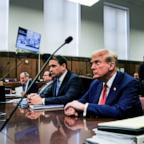Are Millions for the Arts Appropriate in These Tough Economic Times?
Hollywood comes to D.C. to push the case for arts funding to Congress.
April 13, 2010— -- Congressional funding for the arts is almost always a subject of controversy in Washington, but proponents hope this time to tailor their message to show that such funding can help create jobs, and international goodwill.
Supporters are requesting $180 million in appropriations -- or a 7.5 percent increase from last year -- for the National Endowment for the Arts. If Congress were to approve that figure, this would be the most funding ever designated for the arts organization. NEA funding hit a peak in 1992, when the organization received $176 million from Congress.
As lawmakers review annual budget appropriations, advocacy groups are leveraging the power of Hollywood heavyweights to convince members of Congress that supporting the arts can be good for the economy.
"Desperate Housewives" actor Kyle MacLachlan and movie actor Jeff Daniels worked their Hollywood charm on Capitol Hill to rally members of a House appropriations subcommittee, which heard testimonies from these actors, as well as others requesting higher appropriations for the NEA.
"As we toil with the current economic downturn, congressional leaders such as you face the enormous challenge of helping get more of our fellow Americans back to work," MacLachlan said. "It is especially important to me to provide my perspective with you on behalf of those in the creative community who are also facing similar demands on their families."
Perhaps the most unexpected member on the panel that testified before House members today was retired U.S. Army Brigadier Gen. Nolen Bivens, a supporter of the arts who argued that this funding can help the United States face its national security challenges.
"Support of the arts and artists can help to bridge many common values that lead to peaceful resolution of disagreements as well as the sustainment of cordial international relations," Bivens told members of Congress.
The U.S. arts community has "tremendous potential" to help the country deal with "national security challenges," Bivens said.
The retired general described, for example, how National Endowment for the Arts programs and other government efforts provide music therapy to wounded soldiers at Walter Reed Army Medical Center, which "helps them heal both emotionally and physically," and how the National Vietnam Veterans Art Museum in Chicago fosters art inspired by Vietnam combat.
Given the tough economic times, the recent passage of the health care law, and the large jobs bill currently in the Senate, the push for arts funding is likely to take some heat.
Rep. Mike Simpson, the ranking minority member on the subcommittee, said in a statement today that it is too early to speculate on the budget, and that lawmakers need to see NEA's request before making a decision.
"It is a little early to speculate on any budget right now, including that of the NEA," Simpson, R-Idaho, told ABC News in a statement. "This is going to be a difficult budget year, and our subcommittee will be challenged by the need to keep spending down as much as possible. Once we see a 302b allocation and start sorting out the needs of the various agencies within our jurisdiction, we'll have a better idea of how the NEA will be funded in fiscal year 2011."
While it has received support from both sides of the political aisle, the NEA hasn't dodged controversy. In February, Sen. Tom Coburn, R-Okla., blasted the $50 million given to the arts organization from the recovery package as "wasteful and nonstimulative spending."
Simpson also opposed the $50 million stimulus grant to the NEA, saying at the time that it would've been better for Congress members to look at how that money could be spent most wisely.




